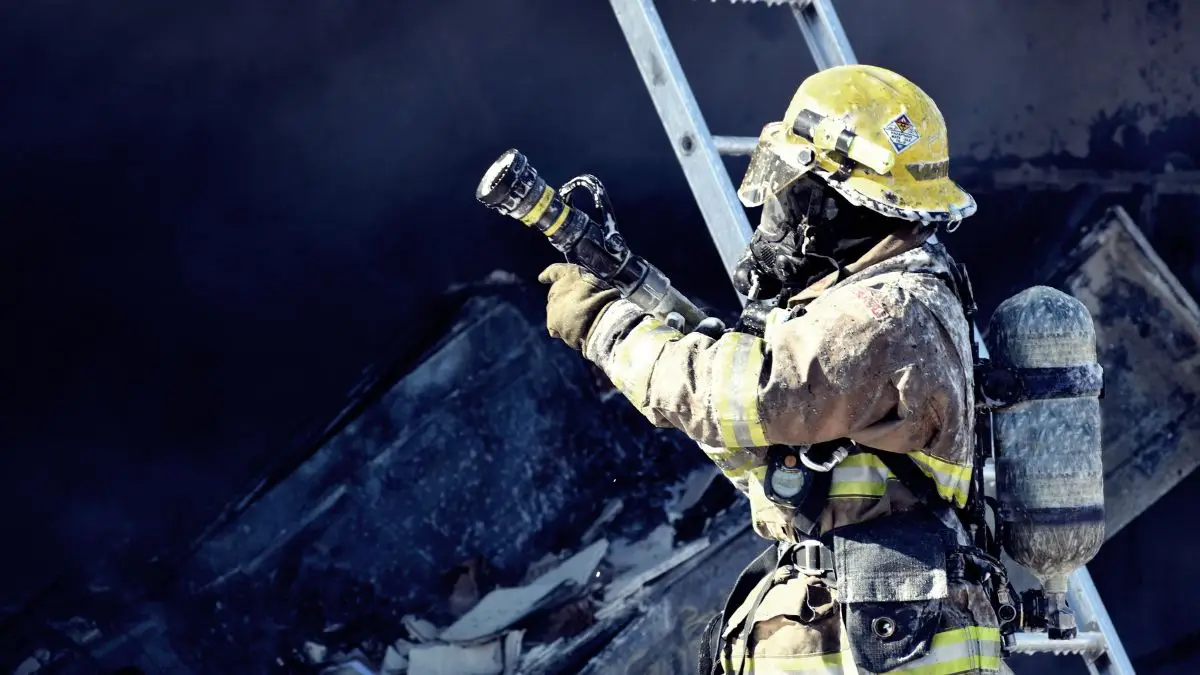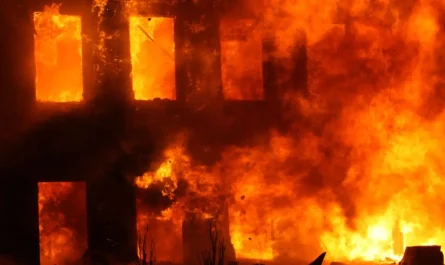Kansas Family Displaced After Garage Fire Caused by Lithium Battery
I’ve told you enough fire stories to know that it’s rarely a simple slow burn. For a moment, everything appears to be OK. You’re running for your life the next moment. When a peaceful home neighborhood in Fairway, Kansas, transformed into a fire zone on Monday night, that is precisely what happened.
When a family of four heard a peculiar noise coming from the garage, they were at home. Then there was a tremendous pop. In a matter of seconds, smoke started to permeate the house as the flames quickly spread.
Their lawnmower’s lithium-ion battery had just been plugged in. That’s all. That routine activity, which most of us take for granted, was sufficient to start a fire that was severe enough to damage their home, ruin their automobile, and bring firefighters from three different departments rushing to the site.
Fortunately, everyone inside escaped without incident. Nobody was harmed. But what about the harm? It’s serious. And the way it all turned out serves as a reminder that battery fires are growing more frequent and harmful rather than being uncommon, freak events.
If your charger started a fire in your garage at this very moment, how would you respond?
Let’s examine what transpired, why things got out of hand so quickly, and what any homeowner may take away from this.
From Plug-In to Panic in Under a Minute
You simply leave a charger plugged in and assume it will function as intended. This Fairway family did just that on Monday night. However, the events that followed are the stuff of nightmares.
Both teenagers and one adult were inside when they heard an explosion coming from the garage, according to FOX 4 KC. They had just begun charging a lawnmower’s lithium-ion battery.
Fire was tearing into the garage in a matter of seconds. The smoke and heat traveled more quickly than most people believe. When the mother called 911, she explained how quickly it spread. The fire started to spread toward the rest of the home before they could even react.
Suddenly, everything was different.
This isn’t simply someone else’s awful day if you’ve ever kept chargers or batteries in your garage or, worse, close to combustible materials. It serves as a warning.
A few weeks ago, after a similar fast-moving fire, one individual was discovered dead inside a house in Maine. I still get shivers from that story.
Why These Batteries Are Becoming a Hidden Threat in Homes?
The fact that most people are unaware of is that, despite their strength, lithium-ion batteries are volatile, particularly when they overheat, swell, or short circuit. And even with everyday tools like an e-bike or a lawnmower, that can occur.
Investigators discovered the battery’s melted remnants at the ignition location in this instance. That is confirmation, not only a hypothesis. The very item we use frequently around our houses was the source of the fire, which the fire chief ultimately declared to be an accident.
This goes beyond a single malfunctioning charger. Fires caused by batteries are increasing throughout the United States. I’ve witnessed cases involving cellphones, power tools, hoverboards, and e-scooters. And the same thing is said nearly every time: It happened so quickly.
The actual threat? You won’t always have another chance to respond.
So, where are you currently getting your batteries charged? Overnight, are they plugged in? Perched next to paint cans or on wooden shelves? Prevention must begin at this point.
Firefighters Battled Flames and a Brutal Heatwave
Imagine the air outside already feeling like an oven, and then racing into a burning house. When first responders got to the scene, they had to deal with that.
The fire started at approximately 5:20 p.m., just as the heat index was reaching 115 degrees Fahrenheit, according to the Johnson County Post. While paramedics worked behind the scenes, distributing water, wet towels, and setting up fans to allow firemen to continue, crews from Fairway, Overland Park, and Shawnee alternated in and out of the fire.
Even so, it took more than an hour to contain the fire.
“Fighting fire in this kind of heat takes a toll,” the chief stated bluntly. And that serves as a crucial reminder that you are looking at more than just the damage caused by a house fire. You’re witnessing the price paid by those who arrive in the most hazardous circumstances in order to keep others safe.
I’m not sure about you, but I remember that kind of work.
Unfortunately, just last month, a man was discovered dead in a Clayton house fire. Some families never have the opportunity to flee.
Don t Wait for Smoke 5 Things to Watch Before It s Too Late
This is where both of us need to take a moment to consider the obvious: the majority of battery fires begin with warning indications. Knowing what to look for before it’s too late is the difficulty.
These five warning signs should never be disregarded:
I have discussed this with fire chiefs and electricians. The majority of them agree that how and where you charge it matters more than just the battery. Wood bookcases, cardboard stacks, unventilated garages, and inexpensive power strips are all potential hazards.
If the tale of this family teaches us anything, it is that even seemingly insignificant behaviors can result in catastrophic events. What’s the worst? Usually, you just receive one warning.
I recently discovered a WhatsApp channel that posts home safety alerts, preventive advice, and real-time fire events. To be honest, there are some updates there that are more helpful than those seen in regular news cycles.
We Lost Everything The Kind of Fire That Doesn t Just Burn Walls
I’ve worked on enough fires to know that the physical harm isn’t the whole picture. People remember what they lost in the silent pictures, the memories, the items that were passed down, and the sense of security that came from home.
That’s what took place here. Their house? Completely destroyed by smoke and fire. The vehicle in the garage? Lost. Heat or haze touched every room within.
The most difficult thing to comprehend, though? It’s how quickly everything disappeared.
The fire chief s words stuck with me: Certainly our thoughts are with the family, as this damage to their home is unexpected and difficult to process. I ve heard that tone before it s not just sympathy, it s the reality of people trying to rebuild what can t always be replaced.
This isn t a story about someone else s mistake. It s about how quickly a normal evening can become an emergency and how easy it is to miss the early signs.
Have you ever thought about what you d grab if you had 30 seconds to leave your house?
It s not just a scary question it s the kind of thing that changes how you charge a battery from now on.
In fact,two firefighters were treated for heat exhaustion in Kennewickafter battling intense flames. These aren t isolated situations they re happening across the country.
Want to Stay Safe? Here s What I d Do Differently After This Fire
After reading about this fire and others like it you start thinking differently about everyday stuff. Charging your battery-powered tools shouldn t feel risky but clearly, it can be.
So if you re wondering how to avoid ending up in the same situation, here s what I d do starting today:
My No-Nonsense Lithium Battery Safety Checklist:
- Never charge batteries unattended, especially overnight
- Only use manufacturer-approved chargers skip the cheap knockoffs
- Keep chargers and batteries away from flammable materials like cardboard, fuel cans, or stored clothes
- Charge large batteries in your garage or an open area, not inside your living space
- Inspect batteries regularly if it s hot, smells weird, or looks warped, stop using it immediately
- Install smoke detectors near charging areas, even in garages or sheds
One thing I ve learned from interviewing fire safety experts: it s rarely about one big mistake. It s small habits where we store, when we charge, and what we overlook that set us up for disaster.
Take 10 minutes today to check your home. That s all it takes to catch something before it turns into everything.
We Thought It Could Never Happen to Us But It Did
family s voice in every detail.
They didn t ignore safety. They didn t leave an open flame or smoke inside. They just charged a battery like most of us do, maybe a hundred times a year. That s what makes this story hit differently.
And they still lost almost everything.
We heard a strange sound then something exploded and we ran.
That line plays over in my head. Because if I m being honest? I ve charged batteries near paint cans. I ve left stuff plugged in overnight. I ve told myself, It s probably fine.
The truth is, that kind of thinking isn t just risky it s outdated. Fires caused by lithium batteries aren t rare anymore. They re fast, violent, and unforgiving.
And if you re reading this thinking, This would never happen to me I hope you re right. But I also hope you re double-checking your charger setup tonight.
For more real stories and practical home safety tips, explore theHome Incidents categoryon Build Like New. Stay informed, stay safe.
Disclaimer:This article is for informational purposes only and does not replace professional fire safety advice. Always consult your local fire department or certified experts for safety inspections. The details shared are based on public reports and official statements at the time of writing.
Table of Contents
-
From Plug-In to Panic in Under a Minute
-
Why These Batteries Are Becoming a Hidden Threat in Homes?
-
Firefighters Battled Flames and a Brutal Heatwave
-
Don t Wait for Smoke 5 Things to Watch Before It s Too Late
-
We Lost Everything The Kind of Fire That Doesn t Just Burn Walls
-
Want to Stay Safe? Here s What I d Do Differently After This Fire
-
We Thought It Could Never Happen to Us But It Did




